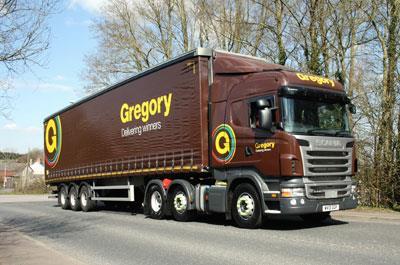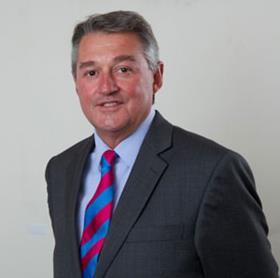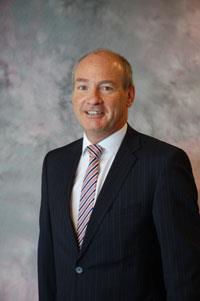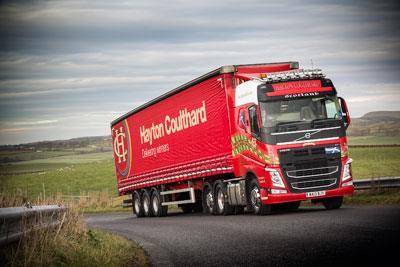
Like many family-owned hauliers, Gregory Distribution is now run by the third generation – in this case CEO John Gregory – after being set up between the two world wars.
“My grandfather started in 1919 with a horse and cart,” says Gregory. “His first truck was an ex-First World War Model T Ford, but the trucks all went off to Second World War. My father joined him when the first truck came back after the war.”
The firm was founded in North Tawton, mid Devon, and although the company is now a national operator with 17 sites around the UK, head office is still there. “In 1985 I came back from Australia and took over from my father,” says Gregory. “I set about building the business up from very strong roots. It was a small business but it made 15% profit. Eventually I outgrew North Tawton and what I could cope with so Andy [Walker, MD] joined me from Wincanton in 1992. We have worked together since then.”
Annual turnover in 1985 was just £1m; by 1992 it had grown to £8m. After a period of rapid growth, turnover in the 2013/14 financial year just ended was nearly £147m, up 13% on the previous year.
But Gregory insists profit margins remain the key focus for the business, not turnover.
“When Andy joined it was a still a golden era of margins of 14%,” he says. “In the 1990s, all sectors of transport saw margins decline by a per cent a year. So we went from double digit to 3% or 4% and they have been around that ever since. We have always believed in margin across the business and if we had a bonus system it would be margin-based.”
Walker says the decline in margins has been due to a combination of “competition and the relentless drive by customers to reduce cost”. “We are always searching for the next innovation and making sure we have the right solution for our customers,” he says. “The drive for efficiency is relentless.”
Gregory adds: “There have been two things for me. When I started, local businesses did not go and seek competitors’ work elsewhere in the country. People like Stobart did that, we did that and inevitably there was price competition. Fuel was 20ppl when I started and to get to 120ppl it went up way above the rate of inflation for years. To recover fuel – which we have always been pretty good at – meant that other cost increases were not recovered. When the Conservatives brought in RPI-plus increases on fuel duty that was a killer.”
Customers
Around 95% of Gregory’s work is for the end customer rather than subcontracting for a 3PL. “We have some relationships with other hauliers and we are big players in pallet networks but we regard Palletline and Palletways as customers,” says Gregory. “The problem with price is that there is over supply – there is an amazing number of people chasing business and they have collectively driven the price down. Because of tenders you are generally only going to get other work if someone fails and if the price is cut.”
Because of the current driver shortage (see panel below) there is now however an upward trend in rates in some parts of the country at least.
“This year we have seen reaction to Driver CPC and driver shortages but the coming year will be the real test,” says Walker. “We’ve had customers talking to us as a result of other hauliers not providing the service because they can’t get drivers for whatever reason. It’s very regional and different pockets of the country are affected differently. So the thinking becomes driven towards where can we get drivers and do we have to change the solution for the customer to suit where the resource is.
“It is inevitable that driver wages will rise as competition grows.”

Some customers do understand that, just as with previous increases in the cost of fuel, rising driver wages are to a large extent outside the control of hauliers and will have to be passed on.
“We have to have mature conversations with our customers to engage them in that process,” says Gregory (pictured, right). “In Scotland there has been a seachange on driver pay in the last 12 months. Customers have got to understand and support that process in the same way they have been supportive of fuel when that rose in price.
“If you engage them early enough they will understand.”
As it has grown over the years, Gregory has also diversified to avoid becoming over-reliant on any one sector.
“Part of our success is how we have diversified,” says Walker. “We are into lots of sectors. There is the traditional part of our business, still dominated by FMCG, food, beverage and consumer products. One of the biggest parts of our business is now temperature controlled – we have 300 fridge trailers. Milk collection is around 17% of our business - it used to be over 30%. We are into waste and have over 100 walking floor trailers. We don’t just carry dry waste such as newspapers and plastics - we are also into wet waste and are doing more green waste such as biomass.”
The firm is also strong in non-food, Gregory points out. “We deliver B&Q kitchens for their main supplier, The Range, which is an enormous player now in the shed world. We do all the storage and transport for British Ceramic Tile, the biggest manufacturer of ceramic tiles in the UK.
“We are in so many different sectors – we go through cycles in all of those but at least that gives us some resilience.”
But Gregory says the strongest growth in recent years has been with the pallet networks.
“That really has been a sweet nut in the transport industry for a long time,” he says. “Not in terms of making money but there are 500 hauliers involved in pallet networks in the UK and without the networks many of those wouldn’t exist today.
“If you go back 20 years when Palletline was created, there was scope for more networks because there were other regional hauliers around. It will only contract when there are fewer regional hauliers to be in the individual networks. There are some challenges there.”
Pallet networks
Gregory Distribution is a long-standing member of Palletline but its subsidiary Kay Transport, which it acquired in 2009, remains a Palletways member. While Gregory’s website proclaims its membership of Palletline, Kay’s site is more cagey, saying only that it “has established membership within the UK pallet network sector”.
“That is controversial,” Gregory admits. “In future, a lot of networks will struggle to have individual players in each region. Some people say that is inevitable that hauliers will cover some of the more remote regions for more than one network. That may be the reality but there is always someone to do transport – there always has been.”
As well as diversifying into many sectors, the company has become less reliant on the South West of England as it has expanded its coverage of the UK.
“Customers in the area from Bristol south and Southampton west would probably be 60% of our turnover,” says Gregory.
According to Walker, some customers are now disillusioned with the large national 3PLs. “They want to avoid putting all their eggs in one basket and are moving away from a tied solution that doesn’t add value,” he says. “Customers say ‘we can have this operation with one of the big ones and get a low management fee but what are they adding?’ They are looking for something else, someone who can be innovative and add some value.”
One possible change that would help operators increase efficiency and make the most of available resources is a relaxation by the major retailers on their insistence that suppliers and their haulage contractors make deliveries in tight time slots.
“A few years ago the catchphrase for a manufacturer was OTIF – on time in full. If their service level to the supermarket was not up to the mark they were in for a price review,” says Gregory. “They put that back down the supply chain to people like ourselves and the challenge on our service is extreme. There is nothing historically priced in for timed collection and delivery – 25 years ago that never existed. The pressure in the morning with timed deliveries is unbelievable.”

Walker (pictured. left) adds: “They want all supplier loads in by a certain time so they can assemble orders. They have squeezed inventory so they want more and more just in time. So we are delivering more frequently and delivering less. We work with our customers’ customers to try and lengthen the window through the day. The more often we can do evening or night deliveries the better. It is about using the truck 24/7.”
But Gregory is realistic enough to know that expectations of almost perfect service levels are unlikely to disappear any time soon.
“The bottom line is the grocery sector dominates a lot of what happens in logistics in the UK and they have never ever had greater pressures of their own than today,” he says. “So can you imagine the pressure they are putting on their suppliers, who are putting it on their suppliers including us.”
After a series of acquisitions in recent years, Gregory Distribution is now clearly the leading operator in the South West.
“We never went out with a strategy to become dominant in the South West,” insists Walker. “It was all about taking opportunities as they arose. We can bring some innovation and add value – we can bring that where a smaller player can’t. That is where we gain some advantage from having that market share.”
Gregory adds: “The irony of being a big player in the South West is that there is always someone who would compete with us on price. I don’t think that by having a bigger market share has helped us margin-wise whatsoever. It has helped us to get business and be recognised and have opportunities.”
Ambition
Gregory says he and Walker were once accused of lacking ambition, a criticism that clearly stung.
“We have never sought growth but there is a neurosis in people like me and Andy that we are going to lose business so you have to make sure you get business as well,” he says. “Over the years we have got more business than we have lost which is why we’ve grown. We have a budget for next year and I was quite pleased to see it wasn’t very much but I am sure we will surpass it.
“We don’t have eyes on businesses that we want to buy. We have taken over a few businesses in the last two years – they are just opportunities that have arisen. If they can bolt on or assist our core business we do it. We have a fair bit of experience of this over the years and some we got right and some we got badly wrong.
“If we didn’t grow in the next three years but we grew our margin I would think we had been very successful. But you can’t go backwards either.”
The company has grown both by acquisition and organically, and its expansion has been funded internally by reinvesting profits rather than by borrowing.
“Enough profit is generated to cope with any business we create,” says Gregory. “We’ve gone from £1m to £150m turnover without using external shareholders pumping funds in. We have used our own resources and ability to raise money. That won’t change – I would rather go backwards than ever let that happen.”
Trucks and trailers
In the last three years the company has invested £43m in new trucks and trailers, and the fleet currently stands at 550 trucks (120 of which are rigids) and 800 trailers. In the last financial year 174 trucks were acquired, almost 100 of which were Euro-6.
“We have very few tractors over three years old,” says Gregory. “A tractor can go any time after three years as long as it gets its book price. We run rigids or specialist trucks for five years. But any vehicle can go at any time as long as it covers its book value.”
In England the bulk of the fleet is Scania, while its joint venture in Scotland Hayton Coulthard mainly runs Volvos (see panel below).
“That is based on intensive fuel trials because mpg is everything. We did a Euro-6 trial with Mercedes-Benz, Daf, Scania and Volvo as we did with Euro-5 two years before. On Euro-5 Scania was clearly on top on fuel; our current test put Scania and Mercedes side by side with Daf and Volvo in third and fourth place,” says Gregory. “It is also linked to full life cost – which includes the purchase price and residual price – and drivers’ opinions. Our relationship with Scania is as solid as we would want with any customer of ours but it has to be the lowest cost solution and mpg completely dominates that. A 0.1mpg improvement is £400,000 on the bottom line.”
Gregory has a strict policy of buying vehicles outright and maintaining them inhouse wherever possible.
“We have no contract hire or operating leases at all,” he says. “We have a balance sheet that means we can raise the money to fund them. Every aspect of operating cost per km we have seen says this is the cheapest way for us to operate.
“We would do contract hire if it was cheaper. I asked a manufacturer for a deal on 10 as a test – it looked like it was £100 a week more to operate than the way we do it. We don’t make £5,000 a year out of that truck, no chance. The cost side of our game is enormously important.”
Walker adds: “We maintain inhouse and have our own workshops predominantly in the South West. We have relationships with dealerships and other people where we can’t do that. I have heard nothing about Euro-6 to say we should change that.”
Gregory’s distinctive dark brown livery harks back to the Great Western Railway, Gregory explains. “A lot of transport businesses around the turn of the century had that brown and cream livery. My grandfather must have just copied it and my father carried it on,” he says. “We have just revamped it and our livery is now a slightly darker brown.”
The company got heavily involved in the 2012 Olympics and it was from that association Walker came up with the strapline ‘delivering winners’ that is now used on the Gregory, Kay and Hayton Coulthard vehicles. While the holding company that owns the various operating companies is still called Gregory Distribution, the liveries now just carry the brand.
“We were called Gregory Distribution but we got rid of it,” says Gregory. “Gregory is a brand like Stobart or Turners. It doesn’t need ‘transport’ or ‘logistics’ or whatever.”
Solving the driver recruitment crisis
Of Gregory Distribution’s 1,500 employees, over 1,000 are drivers, so the current shortage is a serious issue.
“Drivers are able to be more selective and are choosing the type of work that fits in with their lifestyle,” says MD Andy Walker. The big thing for us is how we recruit and bring people into the industry. In the early 2000s we started driver training, bringing in van drivers and training to be truck drivers. That was pretty successful.”
The last recession masked the driver shortage but now volumes are picking up, the extent of the problem of an ageing workforce has been exposed.
“One of our big initiatives has been to attract young people,” continues Walker. “We started it off at the beginning of the year with a very successful open day at our Cullompton DC. We had 70 applicants turn up – 29 of them were offered jobs and 70% of those were under 25. We have now developed that and are working with apprenticeships at Cullompton.”
CEO John Gregory was among the pioneers of the Prince’s Trust’s Get into Logistics initiative, launching it in Plymouth in October 2014. “Out of 50 applicants we employed six ourselves and a customer of ours, Burts Potato Chips, has taken on another four,” he says. “You need the network plus a training and HR department - it is not easy for a smaller haulier.
“We have 12 driver trainers in the business and with those you would think we could take some ownership of our employment and that is an absolute must for us.”
The company has also begun offering more flexible working hours to encourage older drivers to stay on.
“We offer very flexible working,” says Gregory. “Within reason you can ask us for what you want. We would encourage people to go three or four days a week in their 60s – they are our new internal ‘agency’ – that’s the philosophy.
“We have to get away from a reliance on agency drivers. We run a 115% policy – which is that every manager in every part of our transport operation is supposed to have 115% staff.”
But agency labour has its place, Walker concedes.
“I don’t think we will ever get to the point of using no agency drivers at all. In fairness to agencies they have a use. We could never support certain contracts without them.”
Hayton Couthard – Gregory’s Scottish joint venture

Scottish haulier Hayton Coulthard is a fourth generation family business, being founded in 1916 by Peter Coulthard, and now has a fifth generation working in the business. Coulthard named the company after his eldest son Hayton, but it was his brother Jimmy who took the reins and grew the business into the 1940s. When Jimmy died in 1959, his son Duncan left school at 14 to help his mother run the business until his retirement in 2000, and his son Duncan junior – brother of F1 driver David Coulthard - took over.
In 2001, Gregory and Coulthard formed the 50/50 joint venture company that is still based at the original headquarters in Twynholm in the South West of Scotland. But the relationship between John Gregory and Duncan Coulthard senior goes much further back.
“Duncan senior and I met 30 years ago and we had mutual customers,” says Gregory. “He was doing Scotland and we were doing the South West for some of the same customers. Subsequently Duncan junior took the business over and over a period of time we consolidated our relationship into a joint venture.
“We had solutions for customers who geographically found Scotland and the South West of England difficult to service. Coulthard and Gregory’s have been involved in similar activities such as Tautliner, fridge and walking floor transport.”
Despite the recent vote to remain a part of the UK, Scottish customers still prefer to use Scottish hauliers, says Gregory.
“You don’t do good business in Scotland with the name Gregory,” he says. “You need a Scottish business run by Scottish people.”
According to Gregory’s 2012/13 accounts, its share of the joint venture revenue was £7.2m.
“Since the joint venture, the business has gone from strength to strength, and has doubled in size,” says Gregory. “More than that, the business used to be underpinned by a large fleet of owner drivers. It is now predominantly serviced by our own fleet, supported by subcontractors and a limited number of own drivers, and has 130 employees.”
Most of the strikingly liveried Hayton Coulthard fleet is based at its main operating centre at Eccelfechan, on the A74(M) to the east of Dumfries. Its major customer is the UK’s largest bottled water company Highland Spring, which can produce up to 700m litres of water a year from four sites in Scotland.
“Coulthard has been its lead haulier for over 25 years,” says Gregory. “The business is based entirely on artics running too and from Scotland and it does not share vehicles or sites with Gregory. But all the support services such as accounts, HR, It and engineering are provided by Gregory Distribution.”
While the bright red livery of its 80 mainly Volvo tractor units has that distinctive tartan flash, Hayton Coulthard’s 160 trailers share the same livery and “Delivering winners” strapline as Gregory and Kay.













